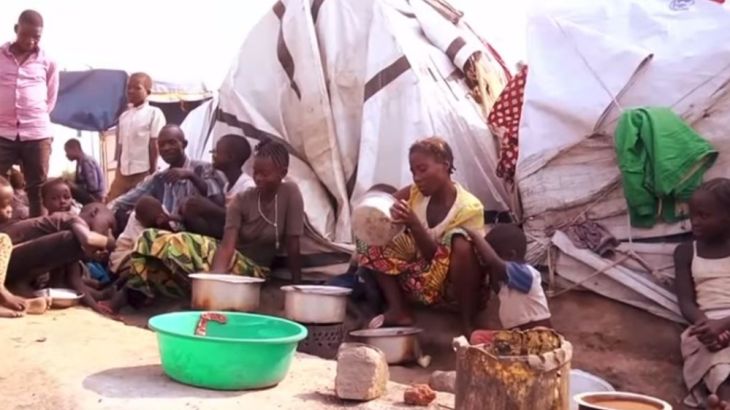
‘Hacked to death’: DRC violence survivors recall horrific scenes
At least 300,000 people have been forced to flee their homes since early June due to ‘multiple attacks’ between ethnic groups, with over 160 killed.
Warning: This video above contains disturbing images
Hundreds of thousands of people have been forced from their homes in northeastern areas of the Democratic Republic of Congo (DRC) in the past two weeks, escaping a wave of resurgent inter-ethnic violence that killed more than 160 people, including babies and young children hacked to death.
Keep reading
list of 4 items‘Crimes against humanity’ may have been committed in Sudan, says UN chief
The Take: How Iran’s attack on Israel unfolded
Europe pledges to boost aid to Sudan on unwelcome war anniversary
The United Nations refugee agency (UNHCR) on Tuesday expressed deep alarm over the flare-up in violence in the DRC’s Ituri province, which it said had seen “multiple attacks” involving the Hema and Lendu groups since early June.
Speaking to Al Jazeera from the Swiss city of Geneva, UNHCR spokesman Babar Baloch said the violence had forced more than 300,000 “desperate people” to flee their homes.
“People have been coming in with horrifying tales of how violence has been unleashed against them,” he said, warning that the figure of those displaced was likely to be higher.
The cause of the latest flare-up was not immediately clear, but it occurred in a region where tens of thousands died in clashes between the Hema and Lendu between 1999 and 2003.
Attacks between the two communities had also displaced some 350,000 in late 2017 and early 2018, killing about 300 people before a tenuous calm took hold.
But last week, four Lendu traders were killed in attacks the Lendu blamed on the Hema, which locals say sparked off the latest violence.
‘Burned alive’
Authorities are still trying to determine the extent of the violence but local officials say at least 161 people have been killed, with all the bodies found coming from a single mass grave in the village of Tche.
“Some people were burned alive inside the houses,” Esther Nzale told Reuters news agency from a camp for displaced persons more than a dozen kilometres away.
Nzale is from Kpatsi, one of the villages inhabited by Hema herders that was attacked last week by armed men believed to belong to the rival Lendu farming community.
“They killed people with machetes and we don’t even know what they did with the bodies.”
|
|
She fled with the surviving members of her family. They found shelter under white and blue tarps in a makeshift camp in Ituri’s capital city, Bunia.
Babies and young children from the Hema ethnic group were among the hundreds of victims hacked to death with machetes.
“A group of people from the hills massacred us and burned our villages,” Ngorima Bakambu Godefroid, an internally displaced survivor said.
“We had no weapons so we couldn’t do anything but watch our village burn and our people die. I lost a lot of members of my family.”
Survivors of last week’s attack on Tche are currently being protected by soldiers from the DRC’s army.
Still, they say they are terrified and want to leave the area if they can find a way around the Lendu rebels who have blocked the surrounding roads.
‘Large-scale displacement’
Baloch, the UNHCR spokesman, said that “large-scale displacement” had been reported in three of Ituri’s five administrative territories, with people fleeing unrest in Djugu territory especially.
“Let’s not forget that the Ituri province is already a complex picture of displacement, and next to Ituri province, in North Kivu, we just started at the end of May helping 100,000 people,” Baloch told Al Jazeera.
“Now we have received in the last two weeks at least on average around 22,000 people daily.”
|
|
Baloch cited reports that both communities were “forming self-defence groups and being involved in revenge killings.
“UNHCR fears this escalation could engulf large parts of the province,” he added.
“We are gravely concerned for the safety of civilians after receiving reports of killings, kidnappings, maiming and sexual violence being unleashed against people.”
The UN displacement estimate was based on reports from local sources in 125 locations, since humanitarian groups do not currently have access to most of the violence-hit areas.
According to the UN, most of those displaced had sought shelter within host communities, but some 30,000 had arrived at existing displacement sites, “where conditions were already dire”.
Many of the displaced urgently require shelter, basic household items and food, Baloch said.
“People are now sleeping in the open or in public buildings,” he told reporters in Geneva.
|
|
Around 10,000 people were camped out in or near the church in Drodro in Djugu territory, without any assistance, he added.
Another 20,000 people had reached Bunia, and efforts were under way to find suitable sites to host them around the city, he added.
“Many more people are trying to get to the relative safety of sites near Bunia but are reportedly blocked by armed youth from both ethnic groups,” he said, adding that others were trying to cross Lake Albert over to Uganda.
DRC has one of the world’s largest numbers of displaced people, with some 4.5 million having fled various conflicts across the vast central African nation.
Ituri and North Kivu province, just to the south, are also trying to roll back a major epidemic of Ebola that has claimed more than 1,400 lives since last August.